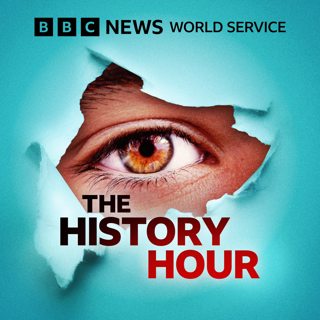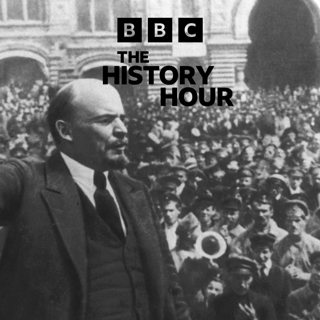
BlackBerry phones and Spot the dog
Max Pearson presents a collection of the week's Witness History interviews from the BBC World Service. Our guest is Jacquie McNish, author and former Senior Correspondent at the Wall Street Journal.We start with the former co-CEO of BlackBerry, who recounts the company's remarkable boom and bust.Then, the creation of the Spot the dog children's books in the 1970s. We hear the testimony of a US soldier who defected to the Soviet Bloc in the 1950s.An author recalls how her 2010 book challenged Norway's immigration policy.The inside story of the creation of the Women's Rugby World Cup in 1991.Finally, the 19th century battle that inspired the Geneva Conventions.Contributors:Jim Balsillie - former BlackBerry co-CEO. Jacquie McNish - Author and former Senior Correspondent at the Wall Street Journal. Chris Hill - son of Eric Hill, creator of Spot the dog. Victor Grossman - US soldier who defected to the Soviet Bloc. Maria Amelie - author of book on Norway's immigration system. Alice D Cooper - organiser of the first Women's Rugby World Cup. Henry Dunant - instigator of the Geneva Conventions, diary read by his descendant Gabriel Martinez.(Photo: Jim Balsillie, former co-CEO of BlackBerry. Credit: Visual China Group via Getty Images)
23 Aug 59min

Indonesian history
Max Pearson presents a collection of the week’s Witness History interviews from the BBC World Service.Our guest is Dr Anne-Lot Hoek, a research fellow at the International Institution of Social History in Amsterdam.This week, we’re looking at key moments in Indonesian history, as the country marks 80 years since independence. We start by hearing about the writer Pramoedya Ananta Toer, who wrote Buru Quartet while imprisoned in the notorious labour camp on Buru island.Then, the reopening of the worlds’ largest Buddhist monument after major restoration work.Plus, 50 years since the Santa Cruz massacre, when Indonesian troops opened fire on independence activists.Also, Jakarta’s ban on the use of dancing monkeys on the city’s streets. And, the discovery of a new species of human.Contributors: Pramoedya Ananta Toer - archive recordings of the writer.Werdi – one of the workers on the project.Dr Anne-Lot Hoek - research fellow at the International Institution of Social History in Amsterdam.Max Stahl - archive recordings of the British cameraman.Femke den Haas – animal rights activist.Peter Brown - Australian paleoanthropologist.(Photo: Pramoedya Ananta Toer. Credit: Reuters)
15 Aug 50min

Nagasaki bomb and Brazil’s biggest bank heist
Max Pearson presents a collection of the week’s Witness History interviews from the BBC World Service. Our guest is Simone Turchetti, Professor of the History of Science and Technology, at The University of Manchester in the UK. It's 80 years since the US dropped atomic bombs on Hiroshima and Nagasaki, forcing Japan to surrender at the end of the Second World War. We hear from a British prisoner of war who was in Nagasaki at the time.Then, the son of musician Dmitri Shostakovich tells of his famous father’s confrontation with Stalin in the 1930s. Also, the story of a man who survived an 8.6 magnitude earthquake that shook the Himalayan mountains in 1950.Plus, Singapore's tense and tearful 1965 separation from the Federation of Malaysia and the detective who tracked down the gang responsible for Brazil's biggest bank heist.Contributors: Simone Turchetti - Professor of the History of Science and Technology, at The University of Manchester. Maxim Shostakovich – son of musician Dmitri Shostakovich Manjeet Kaur- remembering Singapore independence in 1965. Antonio Celso Dos Santos – detective in Brazil Plus, archive recording of Geoff Sherring, a British prisoner of war in Nagasaki and Frank Kingdon-Ward who survived an earthquake that shook the Himalayan mountains in 1950.(Photo: Nuclear explosion over Nagasaki. Credit: Pictures from History/Universal Images Group via Getty Images)
9 Aug 50min

Russian revolutionaries and Japan’s record breaking rollercoaster
Max Pearson presents a collection of this week’s Witness History episodes from the BBC World Service.Our guest is Dr Lara Douds, Assistant Professor of Russian history.We start in 1907, the men who would go on to lead the Russian Revolution met in London for a crucial congress marking a point of no return between the Bolsheviks and the Mensheviks. Then, in 2000, the launch of Steel Dragon 2000 at Nagashima Spa Land in Japan, becoming the world’s longest rollercoaster at nearly 2.5 km in length.Next, the political assisination of Juan Mari Jauregui, a retired Spanish politician and long-time campaigner for independence, by Basque separatists in 2000.Plus, how in 1986, during a world record attempt and publicity stunt, one and a half million balloons were released as a storm rolled over the city.Finally, the story of Chuquicamata, Chile’s abandoned mining town after its 25,000 residents left due to pollution concerns .Contributors: Henry Brailsford - British journalist Dr Lara Douds - Assistant Professor of Russian history Steve Okamoto - rollercoaster designer Maixabel Lasa - widow of Juan Mari Jauregui Tom Holowatch - project manager of BalloonFest '86 Patricia Rojas - former resident of Chuquicamata(Photo: Lenin giving a speech in Red Square. Credit: Universal History Archive/Getty Images)
1 Aug 50min

Saxophone diplomacy and bulletproof vests
Max Pearson presents a collection of the week’s Witness History interviews from the BBC World Service. Our guest is Dr Natalia Grincheva, an expert in cultural diplomacy from Lasalle, University of the Arts in Singapore. We start by hearing about when US president Bill Clinton was presented with a saxophone on a 1994 visit to Prague and he and the Czech president Vaclav Havel performed together on stage.Then, India’s first female anthropologist, Irawati Karve.Twenty years on, the cousin of John Charles de Menezes, describes the day the unarmed Brazilian man was shot dead by anti-terrorism police in London.Plus, the discovery of the super-strong fibre Kevlar in 1965 which was used in bulletproof vests.And finally, 50 years on from the premiere of the Broadway hit A Chorus Line, an original cast member shares her memories.Contributors:Urmilla Deshpande – granddaughter of Irawati Karve.Patricia da Silva – cousin of Jean Charles de Menezes.Baayork Lee – Connie in A Chorus LinePlus, archive recording of Stephanie Kwolek, and material from the Vaclav Havel Center and the William J Clinton Presidential Library.(Photo: President Bill Clinton accepts a saxophone as a gift from a Belgian delegation in 1994. Credit: Luke Frazza/AFP via Getty Images)
25 Juli 50min

Nuclear diplomacy and Italo disco
Max Pearson presents a collection of the week's Witness History interviews from the BBC World Service. Our guest is Dina Esfandiary, Middle East Geo-economics Lead at Bloomberg Economics.We start in 2015 with insider accounts of the Iran nuclear deal and the Greek debt crisis.Then, the 1995 'Turbot War' between Canada and Spain.We hear how international broadcaster Voice of America was born during World War 2. Finally, the rise of Italo disco in the early 1980s.Contributors:Baroness Catherine Ashton - EU High Representative for Foreign Affairs and Security Policy. Dina Esfandiary - Middle East Geo-economics Lead at Bloomberg Economics. Euclid Tsakalotos - Greece's Finance Minister. Brian Tobin - Canada’s Minister for Fisheries and Oceans. Ryan Paris - singer of Dolce Vita.(Photo: Iran's Foreign Minister Mohammad Javad Zarif and US Secretary of State John Kerry in 2015. Credit: Thomas Imo/Photothek via Getty Images)
19 Juli 51min

The 'trial of the juntas' and Evita’s missing body
Max Pearson presents a collection of the week’s Witness History episodes, all with an Argentine theme. We find out more about the 1985 ‘trial of the juntas’ when the country’s former military leaders stood accused of torturing and murdering thousands of their own people. And we hear from historian Dr Victoria Basualdo about life in Argentina, both before and after the trial.Also, the story of the grandmothers who championed the study of genetics to find their missing loved ones. And why tens of thousands of protesters took to the streets of Buenos Aires in 2015. Plus, the bizarre story of Eva Peron's disappearing corpse. And finally, more on the Argentine animator who Walt Disney wanted to hire.Contributors: Luis Moreno Ocampo - prosecutor Dr Victoria Basualdo – historian, FLACSO, the Latín American School of Social Sciences Dr Victor Penchaszadeh – geneticist Agustina Paz Frontera – journalist and writer Domingo Tellechea – art restorer and embalmer Hector Cristiani – grandson of Quirino Cristiani(Photo: Forensic anthropologist Clyde Snow giving testimony to the trial, 1985. Credit: Daniel Muzio/AFP via Getty Images)
12 Juli 50min

Dancing in the Street and Ai Weiwei
Max Pearson presents a collection of the week's Witness History episodes including the story behind Mick Jagger and David Bowie's duet for Live Aid in 1985 and the Chinese artist who was jailed for his art inspired by the Sichuan earthquake in 2008. He speaks to music journalist Alice Austin to explore other concerts in world history that have had a political impact. Also, the American politician who first coined the phrase "drill, baby, drill" in 2008, the making of Back To The Future in 1985 and the trophy killing of Cecil the Lion in Zimbabwe in 2015.Contributors: Bernard Doherty - former Live Aid press officer. Alice Austin - music journalist. Ai Weiwei - artist. Prof Andrew Loveridge - zoologist who studied Cecil the lion. Michael Steele - the former Lieutenant Governor of Maryland, who came up with the slogan "Drill, baby, drill!" Bob Gale - the co-writer and producer of the Back to the Future.(Photo: Mick Jagger and David Bowie performing Dancing In The Street. Credit: Brian Cooke / Redferns)
5 Juli 50min






















